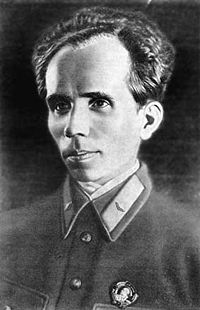- Nikolai Ostrovsky
-
Nikolai Alexeevich Ostrovsky 
Nikolai OstrovskyBorn September 29, 1904
Viliya, UkraineDied December 22, 1936 (aged 32)
Moscow, USSROccupation novelist, soldier, Communist Party worker Nationality Russian Nikolai Alexeevich Ostrovsky (Russian: Николай Алексеевич Островский) (29 September 1904 – 22 December 1936) was a Soviet socialist realist writer, who published his works during the Stalin era. He is best known for his renowned novel How the Steel Was Tempered on the Russian Civil War.
Contents
Life
Ostrovsky was born in the village of Viliya (Russian: Вилия) near Ostroh in the Volyn' governorate in Ukraine (Volhynia), then part of the Russian Empire, into a Ukrainian working class family. He attended a parochial school until he was nine and was an honor student. In 1914, his family moved to the railroad town of Shepetivka where Ostrovsky started working in the kitchens at the railroad station, a timber yard, then becoming a stoker's mate and then an electrician at the local power station. In 1917, at the age of thirteen he became a Bolshevik party activist.[1] At the same period he contracted ankylosing spondylitis which would later blind and paralyze him.[1]
According to the official biography, when the Germans occupied the town in the spring of 1918, Ostrovsky ran errands for the local Bolshevik underground. In July 1918 he joined the Komsomol and the Red Army in August. He served in the Kotovsky cavalry brigade. In 1920 he was reportedly wounded near Lviv and contracted typhus. He returned to the army only to be wounded again and was demobilized on medical grounds. However, in the autobiography written by Ostrovsky himself, he does not mention that he had served in the Red Army.
In 1921, he began working in railway workshops of Kiev as an electrician and as the secretary of the local Komsomol.
Suffering from rheumatism and typhus, in August 1922 he was sent to Berdyansk, a resort on the Sea of Azov, for treatment. In October 1922 he was officially declared an invalid; however he continued working. In 1923 he was appointed Commissar of the Red Army's Second Training Battalion and Komsomol secretary for Berezdov in western Ukraine. In January 1924 he went to Izyaslav as the head of Komsomol district committee and in August 1924 he joined the Communist Party. In 1925, with his health rapidly declining, he went to Kharkov for medical treatment and in May 1926 he went to a sanatorium in the Crimea. By December 1926 polyarthritis deprived him of almost all mobility and be became virtually bedridden. In December 1927 Ostrovsky began a correspondence course at the Sverdlov Communist University in Moscow that he completed it in June 1929. In August, he lost his vision.
Undaunted by his immobility and blindness, in 1930, he began work on first novel, How the Steel Was Tempered, which became renowned and influential in the Communist world. He also wrote articles for newspapers and journals and spoke often on the radio. In April 1932 he became a member of the Moscow branch of the Association of Proletarian Writers and in June 1934 he joined the Union of Soviet Writers. On October 1, 1935, he was awarded the Order of Lenin.
After suffering for years from paralysis, illness and blindness due to congenital ankylosing spondylitis as well as complications after the typhus, Ostrovsky died on 22 December 1936, aged 32. His death did not allow him to complete his second novel, Born of the Storm on the Russian Civil War in Ukraine.
Legacy
His novel How the Steel Was Tempered is considered one the most influential works of Communist literature. In Moscow during the Communist period the Ostrovsky Museum and the Ostrovsky Humanitarian centre were built. They preserve his study and bedroom, while other exhibits include showcases of the achievements of disabled people like Nikolai Fenomenov and Ludmilla Rogova. [1]
Quotations
Man's dearest possession is life. It is given to him but once, and he must live it so as to feel no torturing regrets for wasted years, never know the burning shame of a mean and petty past; so live that, dying he might say: all my life, all my strength were given to the finest cause in all the world- the fight for the Liberation of Mankind.See also
References
Sources
- Entry in the Encyclopedia of Soviet Writers
- Jurij Mycyk. Did the Author of Pavka Korchagin Take Part in the Civil War? (Ukrainian)
- Bohdan Dem′janchuk. How Ostrovsky Was Tempered (Ukrainian)
- Petro Kraljuk. The “Steel” Man from Shepetivka (Ukrainian)
- Svitlana Kabachynsjka. Life Free from Shame (Russian)
Categories:- 1904 births
- 1936 deaths
- People from Ostroh Raion
- Burials at Novodevichy Cemetery
- Russian novelists
- Soviet novelists
- Socialist realism writers
- Ukrainian people
Wikimedia Foundation. 2010.
